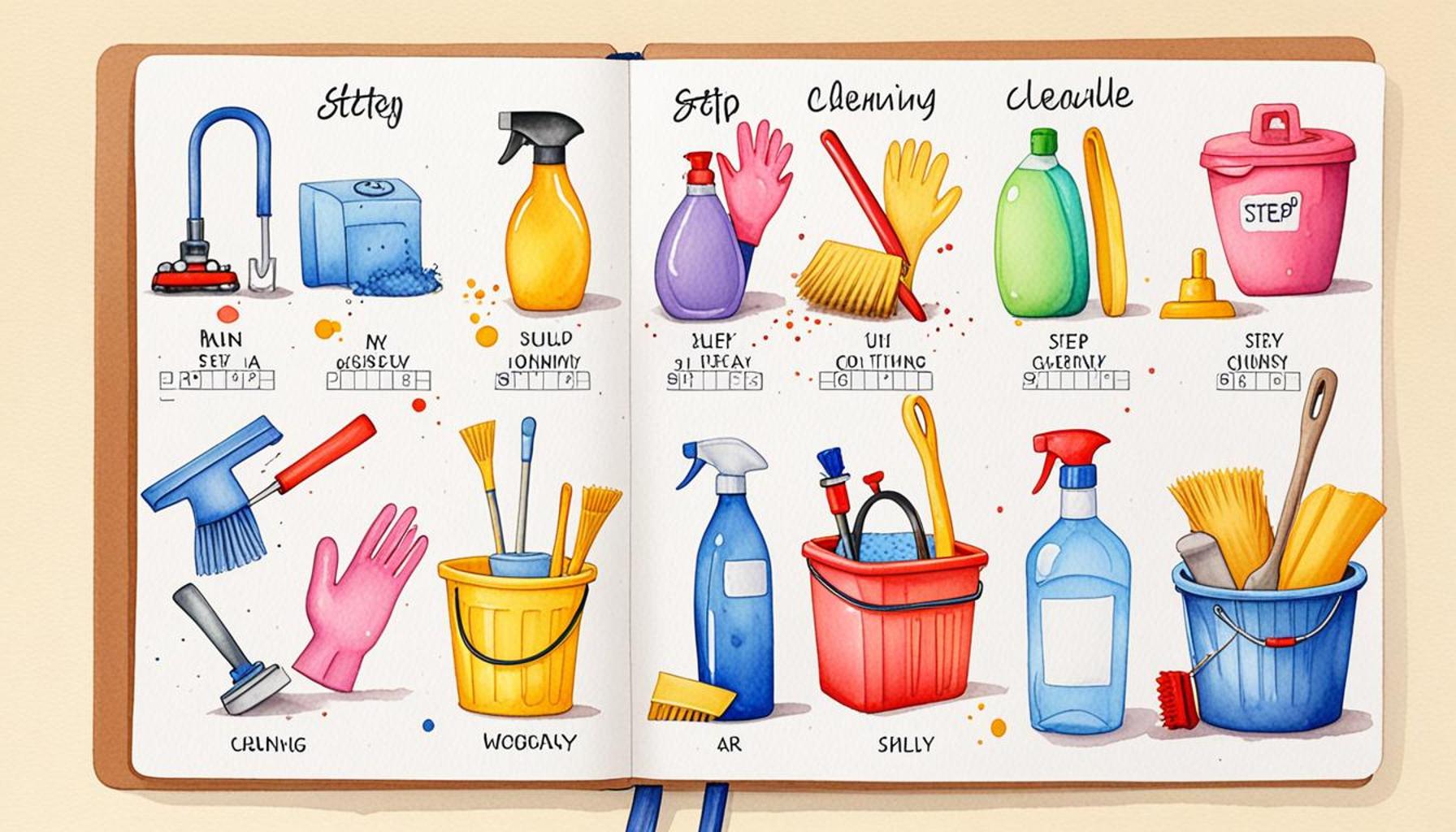Ultimate Step-by-Step Guide Create Your Weekly Cleaning Schedule

Streamlining Your Space
Staying organized in a busy world can feel overwhelming, especially when it comes to household chores. A well-structured weekly cleaning schedule not only saves time but also keeps your home in shipshape. Let’s explore how to craft a tailored plan that works for you!
The Benefits of a Cleaning Schedule
Implementing a cleaning schedule brings several advantages that extend beyond mere tidiness.
- Efficiency: By dividing larger tasks into manageable sections, you can tackle the workload without feeling daunted. For example, designate Mondays for bathrooms, Tuesdays for bedrooms, and so on. This prevents overwhelming cleaning marathons and allows you to focus on one area at a time.
- Clarity: When you know exactly what needs to be done each day, it eliminates the mental clutter. This clarity can make it easier to schedule family activities or personal downtime, ensuring a well-balanced approach to your week.
- Motivation: A set plan provides a sense of purpose and accomplishment. Marking off completed tasks on a checklist can be quite gratifying and motivates you to keep going.
Additionally, having a weekly cleaning routine can enhance your mental well-being. Studies suggest that decluttering one’s living space can result in reduced anxiety levels and a more serene mindset. The act of cleaning can also lead to increased productivity, as a tidy environment often encourages focus and creativity. Imagine settling down for a work session in a clean, organized home versus a disheveled space; the contrast in motivation is unmistakable.
Understanding Your Needs
Every household is unique, with specific requirements that dictate the most effective cleaning schedule. Consider essential factors before you design your routine.
- Number of occupants: The more people living in your home, the more cleaning likely needs to happen. Family dynamics also play a role; if you have young children, for instance, frequent tidying could be necessary.
- Type of pets: Furry companions can add joy to a family but also require additional attention regarding cleaning. If you have dogs or cats that shed, you may need to allocate specific days for vacuuming and washing pet items.
- House size and layout: A larger home will naturally require more time and effort to clean. Pay attention to layouts; multi-level homes may require different strategies compared to single-story living arrangements.
By identifying these elements, you can create a personalized and effective cleaning routine that truly meets your needs. Is your goal to have a spotless home, or are you simply seeking to reduce clutter? Identifying your objectives can lead to an even more refined cleaning plan. Ready to dive in? This ultimate step-by-step guide will walk you through each phase to ensure your cleaning schedule is not just functional, but also sustainable.

CHECK OUT: Click here to explore more
Getting Started with Your Weekly Cleaning Schedule
Creating a weekly cleaning schedule might sound like an overwhelming task, but taking systematic baby steps can make the process manageable and even enjoyable. To start building your schedule, dedicating time to assess your priorities and understanding the cleaning demands of your home is essential. This way, you can ensure that nothing slips through the cracks as you go about your week.
Assessing Your Cleaning Tasks
Before diving into the nitty-gritty of scheduling, take a moment to evaluate the various cleaning tasks that your home requires. Different spaces demand different levels of attention, so it’s essential to categorize your chores to create a balanced cleaning routine.
- Daily Tasks: These are the day-to-day activities necessary to maintain order in your home. Examples include washing dishes, wiping down kitchen counters, and making the bed. These tasks are often quick and can be integrated into your morning or evening routines.
- Weekly Tasks: Items like vacuuming, mopping floors, and cleaning bathrooms typically fall under this category. Aim to space these tasks throughout the week to prevent them from piling up and becoming daunting.
- Monthly and Seasonal Tasks: These chores include deep cleaning projects such as organizing closets, washing window treatments, or scrubbing baseboards. Estimate how often you need to complete these tasks and create a separate checklist or integrate them monthly.
By categorizing your chores, you can easily visualize what needs attention and craft a schedule that divides the tasks evenly throughout the week. This technique not only promotes efficiency but also helps prevent burnout by ensuring you’re not tackling all your chores in one sitting.
Setting Your Schedule
It’s time to translate your chore categories into an actionable weekly schedule. Find a calendar or planner that works for you—whether digital or paper—and start filling in the details. Consider these tips:
- Choose Consistent Days: Assign specific tasks to specific days, making it easier to remember and create a routine. For instance, commit to vacuuming on Wednesdays and cleaning the bathrooms every Saturday.
- Consider Time Commitments: Take into account your personal and family schedules when assigning tasks. If your weekends are busy with family activities, you might want to focus on lighter chores during the week and reserve weekends for deeper cleaning.
- Be Flexible: Life happens! Leave room in your schedule for adjustments when unexpected events arise. Either swap cleaning tasks within the week or double up on lighter chores another day if you fall behind.
As you map out your weekly cleaning schedule, remember that this plan should adapt to your rhythm and preferences. By crafting a realistic and tailored schedule, you set yourself up for success in maintaining not just a clean home, but also a calmer, more organized lifestyle.
| Advantage | Description |
|---|---|
| Increased Efficiency | Implementing a weekly cleaning schedule ensures each task is completed without the overwhelm of last-minute rushes. |
| Time Management | Allocating specific days for tasks creates a structured approach, allowing for better time management throughout the week. |
| Enhanced Cleanliness | Regular scheduling prevents accumulation of dirt and clutter, leading to an overall cleaner living space. |
| Reduced Stress | Having clarity on what needs to be done reduces the mental load, thereby minimizing stress related to cleaning. |
Creating a weekly cleaning schedule can truly transform your home maintenance routine. The advantages outlined in the table above demonstrate how a structured plan can foster a more organized, healthier, and stress-free environment. With the right tools and approach, you can revolutionize your cleaning methods, making them not only easier but also more enjoyable. Whether it’s tackling specific areas on set days or dividing heavier tasks throughout the week, the impact on your living space is profound. Explore methods and ideas to tailor a schedule that fits your lifestyle, enhancing both productivity and serenity in your home.
CHECK OUT: Click here to explore more
Sticking to Your Weekly Cleaning Schedule
Now that you have formulated your weekly cleaning schedule, the next crucial step is to ensure you stick to it. Consistency is the backbone of any successful routine, and maintaining motivation is key to achieving a clean and organized home. Here are some proven strategies to help you stay on track and make your cleaning experience rewarding.
Creating a Motivating Environment
Your cleaning environment can significantly influence your motivation and effectiveness. Consider the following tips to create a space where cleaning feels less like a chore and more like a satisfying endeavor:
- Play Music or Podcasts: Listening to your favorite tunes or an engaging podcast can transform the cleaning experience. Create a dedicated playlist that invigorates you to keep moving or stay informed while tackling your chores.
- Set a Timer: Utilizing the Pomodoro technique—working for 25 minutes and then taking a 5-minute break—may boost productivity and maintain focus. You can challenge yourself to complete as much as possible within that timeframe, making cleaning feel like a game.
- Reward Yourself: After completing your tasks, reward yourself with something enjoyable. Whether it’s a relaxing cup of tea, a few episodes of a beloved show, or some time spent on your favorite hobby, this positive reinforcement can encourage you to maintain your schedule.
Involving the Family
If you live with family members or roommates, consider making cleaning a shared responsibility. Not only will this lessen your workload, but it will also foster teamwork and communication. Here’s how to get everyone involved:
- Assign Age-Appropriate Tasks: Tailor chores according to the ages and abilities of your family members. Younger children can help with simple tasks like putting away toys, while teenagers can be responsible for their rooms or helping with laundry.
- Create a Chore Chart: Visual aids can be incredibly effective for families. A chore chart displayed in a common area can help keep everyone accountable. As an added bonus, consider implementing a reward system for completing chores to encourage participation.
- Make it Social: Turn cleaning into a social occasion. Engage in conversations, laugh together, and even break out the dance moves while cleaning. Making it fun can enhance the overall experience and lessen the burden of chores.
Evaluating Your Progress
To ensure your weekly cleaning schedule remains effective, it’s essential to periodically evaluate its functionality and adapt as needed. Consider these methods for ongoing assessment:
- Reflect Weekly: At the end of each week, take a moment to assess what worked and what didn’t. Did you manage to stick to your schedule? Were there particular days that felt overwhelming? Reflecting on these questions can aid in making necessary adjustments.
- Gather Input: Initiate conversations with your family or housemates about the cleaning schedule. Are there chores they find too burdensome? Seek their feedback to create a more equitable distribution of responsibilities.
- Be Open to Changes: As seasons change, so too may your cleaning needs. For example, during winter, it might be necessary to focus on removing mud and salt residues around the home. Be open to evolving your schedule to meet your current living conditions.
Establishing a structured weekly cleaning schedule is an excellent way to elevate the cleanliness and organization of your home. By creating a motivating environment, involving family members, and evaluating progress regularly, you can ensure that maintaining a clean space is sustainable and enjoyable.
CHECK OUT: Click here to explore more
Conclusion
Creating a weekly cleaning schedule is not only about keeping up with household chores; it’s a transformative tool that can foster a sense of order and tranquility in your living space. By following the steps outlined in this guide—crafting a personalized checklist, engaging your family, and evaluating your progress—you’re setting yourself up for success in maintaining a clean and organized home.
As you embark on this new routine, remember that flexibility is essential. Life can throw surprises your way, and it’s okay to adapt your schedule to fit changing needs or unexpected events. Make your cleaning process enjoyable by incorporating music, rewards, and even social elements that encourage engagement among family members. The combination of these techniques will reinforce the notion that cleaning is not merely a task, but a shared effort that strengthens bonds and creates a welcoming atmosphere.
Moreover, the process does not just bring physical cleanliness; it can also enhance mental clarity and well-being. A tidy environment can invigorate productivity and invite a sense of peace into your everyday life. So as you embark on this journey, take pride in your accomplishments, celebrate the little victories of a spotless home, and remember that a bit of planning can go a long way in simplifying your life.
For more tips and detailed insights on maintaining your household, continue to explore other resources related to home organization and cleaning strategies. Your journey to a cleaner, more organized home is just beginning!



